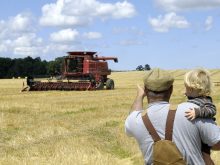AT PRESS time for this issue, talks had broken down between Canadian National Railway and the union representing conductors and brakemen, the United Transportation Union. As hope for a quick settlement diminished amid rotating strikes and lockouts, the Conservative government was planning to revive back to work legislation first introduced in February to end the job action, as it should.
And it must also bring in long-term conflict resolution mechanisms that will ward off similar situations in the future.
In February, a 15 day strike by the same 2,800 union members caused shipping backlogs, havoc for farmers and shippers and demurrage charges of $300,000 daily paid to waiting ships.
Read Also

Crop profitability looks grim in new outlook
With grain prices depressed, returns per acre are looking dismal on all the major crops with some significantly worse than others.
It also brought immeasurable harm to Canada’s reputation as a reliable supplier.
It wasn’t long before reports surfaced of international customers placing their orders with Canada’s competitors, with whom delivery is more dependable.
That job action ended when the union agreed to a tentative deal so it could avoid back-to-work legislation. However, the deal, which included a three percent raise and a $1,000 signing bonus, has been rejected by 79 percent of union members who voted.
That vote has prompted the need to force union members back to work to minimize the hurt to farmers, who risk being unable to generate needed cash for seeding if they cannot deliver their crops to full elevators. In the process, the federal government must ensure a fair deal for both parties.
The union has expressed concerns about concessions CN has asked for regarding rest periods, scheduled days off and mileage rules that regulate how much each employee works.
CN is coming off its most profitable year ever, earning a record $2.1 billion profit in 2006.
Final offer arbitration, a solution the union feared the last time, should be carefully studied as a more permanent solution that would kick in when management-union negotiations reach an impasse.
It would require both parties to submit their bottom line offers, with an arbitrator then selecting one of the two proposals in its entirety. The process would force both parties to compromise and put forward their best offers.
While federal labour minister Jean-Pierre Blackburn was planning to move to end the strike, he failed to get co-operation from all opposition parties to fast-track the bill when the NDP said it will not grant such approval.
The NDP is trapped between its traditional support for organized labour and the welfare of grassroots farmers from which it sprang. Its ties to labour apparently take precedent.
Farmers are facing a year with the sunniest outlook in recent memory. Their prospects must not be allowed to dim because of a strike over which they have no control.
Bruce Dyck, Terry Fries, Barb Glen, D’Arce McMillan and Ken Zacharias collaborate in the writing of Western Producer editorials.














